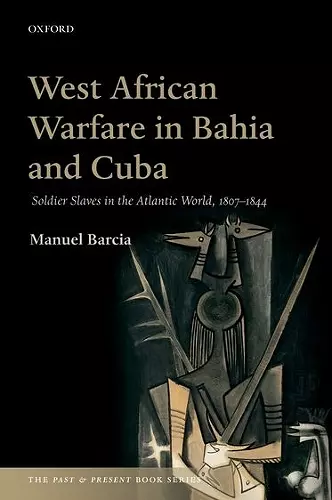West African Warfare in Bahia and Cuba
Soldier Slaves in the Atlantic World, 1807-1844
Format:Paperback
Publisher:Oxford University Press
Published:28th Apr '16
Currently unavailable, and unfortunately no date known when it will be back

West African Warfare in Bahia and Cuba seeks to explain how a series of historical events that occurred in West Africa from the mid-1790s - including Afonja's rebellion, the Owu wars, the Fulani-led jihad, and the migrations to Egbaland - had an impact upon life in cities and plantations in western Cuba and Bahia. Manuel Barcia examines the extent to which a series of African-led plots and armed movements that took place in western Cuba and Bahia between 1807 and 1844 were the result - or a continuation - of events that had occurred in and around the Yoruba and Hausa kingdoms in the same period. Why did these two geographical areas serve as the theatre for the uprising of the Nagôs, the Lucumís, and other West African men and women? The answer, Barcia argues, relates to the fact that plantation economies supported by unusually large numbers of African-born slaves from the same - or close - geographical and ethnic heritage, which transformed the rural and urban landscape in western Cuba and Bahia. To understand why these two areas followed such similar social patterns it is essential to look across the Atlantic - it is not enough to repeat the significance of the African background of Bahian and Cuban slaves. By establishing connections between people and events, with a special emphasis on their warfare experiences, Barcia presents a coherent narrative which spans more than three decades and opens a wealth of archival research for future study.
In this slim but impressive book, Manuel Barcia takes a different path, focusing on the military background of the enslaved Yoruba and Hausa slaves and looks at their impact in Cuba as well as Brazil. * John Thornton, Journal of African Military History *
Barcia's book is a very valuable study in a new research field which can be recommended sincerely to colleagues and students. * Dr Ulrike Schmieder, Leibniz University of Hanover, Reviews in History *
impressively researched and argued ... [this book should] be welcomed as making new contributions to the field ... show[s] that slaves were active in assessing their own situation and were probably far more aware of what was going on internationally than anyone ever gave them credit for. * Tim Lockley, Slavery & Abolition *
serious and precise ... intelligently beyond the traditional scope of the monographic study, offers new and promising avenues for interconnected research ... [this book] aims to demonstrate that practices of slave resistance in the Americas were not traces of a "survival", but rather a continuous adaptation which is an extension of their [African] history. * Catherine Coquery-Vidrovitch, Politique africaine [translation] *
remarkable ... Barcia demonstrates great originality in using, in part, archival sources from Brazil and Cuba towrite African history. In so doing, he provides amodel for future scholarship. Sources for pre-twentieth century African history are relatively scarce, but Barcia shows thatwe can learn much by examining documents in the Americas ... move[s] us well beyond our decades-long obsession with comparisons between slavery in the US South and all other places [and opens] up new possibilities for future comparative histories and tell us much about slavery in two parts of the Americas that received tremendous numbers of enslaved Africans in the nineteenth century. * Walter Hawthorne, Atlantic Studies *
Barcia has done a fine job of matching up large and complex literatures and of plotting a novel path for understanding the interconnected nature of Yorubaland, Hausaland and the Americas in the nineteenth century. * Toby Green, English Historical Review *
- Winner of Winner of the Philip Leverhulme Prize 2014.
ISBN: 9780198754268
Dimensions: 234mm x 156mm x 11mm
Weight: 327g
206 pages